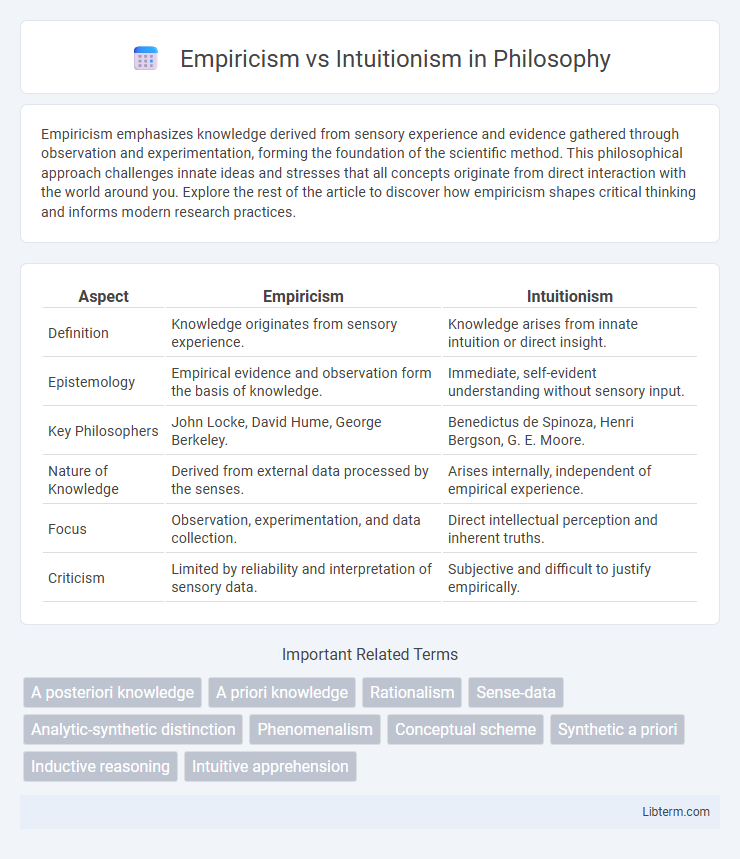Empiricism emphasizes knowledge derived from sensory experience and evidence gathered through observation and experimentation, forming the foundation of the scientific method. This philosophical approach challenges innate ideas and stresses that all concepts originate from direct interaction with the world around you. Explore the rest of the article to discover how empiricism shapes critical thinking and informs modern research practices.
Table of Comparison
| Aspect | Empiricism | Intuitionism |
|---|---|---|
| Definition | Knowledge originates from sensory experience. | Knowledge arises from innate intuition or direct insight. |
| Epistemology | Empirical evidence and observation form the basis of knowledge. | Immediate, self-evident understanding without sensory input. |
| Key Philosophers | John Locke, David Hume, George Berkeley. | Benedictus de Spinoza, Henri Bergson, G. E. Moore. |
| Nature of Knowledge | Derived from external data processed by the senses. | Arises internally, independent of empirical experience. |
| Focus | Observation, experimentation, and data collection. | Direct intellectual perception and inherent truths. |
| Criticism | Limited by reliability and interpretation of sensory data. | Subjective and difficult to justify empirically. |
Understanding Empiricism: Foundations and Core Principles
Empiricism asserts that knowledge primarily derives from sensory experience, emphasizing observation and experimentation as the foundation for understanding reality. Core principles include the rejection of innate ideas, the reliance on empirical evidence, and the use of inductive reasoning to formulate generalizations from specific observations. This philosophical approach contrasts with intuitionism by prioritizing data-driven insights over innate or intuitive knowledge claims.
The Essence of Intuitionism: Key Concepts and Origins
Intuitionism, rooted in early 20th-century philosophy, emphasizes that mathematical truths are known through direct mental insight rather than sensory experience or empirical evidence. Key concepts include the constructive nature of mathematics, where knowledge arises from intuitive mental constructions, rejecting the law of excluded middle prevalent in classical logic. Founded by L.E.J. Brouwer, intuitionism challenges empiricism by positing that mathematical objects exist only when constructed by the mind, highlighting the primacy of intuition in mathematical reasoning.
Historical Evolution: Empiricism and Intuitionism in Philosophy
Empiricism, rooted in the works of John Locke and David Hume during the 17th and 18th centuries, emphasizes knowledge acquisition through sensory experience and observation. Intuitionism, emerging prominently in the early 20th century with philosophers like L.E.J. Brouwer, highlights the role of innate intuition and immediate understanding in mathematics and ethics. The historical evolution of these philosophies reflects a shift from empirical evidence as the sole knowledge source to acknowledging inherent cognitive faculties in comprehending abstract concepts.
Notable Thinkers: Major Proponents of Empiricism vs Intuitionism
John Locke and David Hume are major proponents of empiricism, emphasizing knowledge through sensory experience and observation. In contrast, G.E. Moore and L.E.J. Brouwer champion intuitionism, arguing that certain truths are known immediately through intellectual insight rather than empirical evidence. These contrasting philosophies highlight the debate between knowledge derived from external data and innate cognitive processes.
Epistemological Differences: How Knowledge is Acquired
Empiricism asserts that knowledge is primarily acquired through sensory experience and empirical evidence, emphasizing observation and experimentation as the foundation of understanding. Intuitionism, by contrast, argues that certain knowledge, especially in mathematics and ethics, is gained through innate intuition or direct insight without reliance on sensory input. These epistemological differences highlight empiricism's reliance on external data versus intuitionism's trust in internal cognitive processes for acquiring knowledge.
Empirical Evidence vs Intuitive Insight: Methods of Justification
Empiricism relies on empirical evidence gathered through observation, experimentation, and sensory experience as the primary method of justification for knowledge claims. In contrast, intuitionism emphasizes intuitive insight, where certain truths are known directly through intellectual intuition without dependence on external evidence. The debate centers on whether objective justification derives from tangible data or inherent mental apprehension.
Criticisms and Limitations of Empiricism
Empiricism faces criticism for its reliance on sensory experience, which can be subjective, incomplete, or misleading, limiting its ability to provide universal truths. Critics argue that empiricism struggles to account for a priori knowledge, such as mathematical truths and ethical principles, which seem independent of sensory data. Furthermore, empirical methods may fail to capture abstract concepts and intuitive insights that intuitionism emphasizes as essential for understanding.
Challenges and Critiques of Intuitionism
Intuitionism faces challenges related to its reliance on self-evident moral truths, which critics argue lack empirical verifiability and can lead to subjective interpretations. The difficulty in establishing universal moral intuitions raises concerns about cultural and individual variability, undermining its claim to objective ethical knowledge. Furthermore, intuitionism struggles to provide clear criteria for resolving moral disagreements, making it less practical compared to empiricism's reliance on observable evidence.
Modern Perspectives: Empiricism and Intuitionism in Contemporary Thought
Modern perspectives on empiricism emphasize evidence-based knowledge grounded in sensory experience, shaping scientific methodologies and cognitive psychology. Intuitionism, particularly in contemporary philosophy and mathematics, highlights innate understanding and self-evident truths as fundamental to ethical reasoning and mathematical proof. Recent debates explore how empiricism's reliance on observation complements intuitionism's emphasis on immediate cognition in decision-making and theory formation.
Bridging the Divide: Integrative Approaches to Knowledge
Empiricism emphasizes knowledge derived from sensory experience and observation, while Intuitionism prioritizes innate understanding and immediate cognition. Integrative approaches to knowledge seek to bridge this divide by combining empirical evidence with intuitive insights, fostering a more holistic epistemological framework. Such methods enhance cognitive flexibility, enabling a dynamic interplay between data-driven analysis and inherent cognitive structures.
Empiricism Infographic

 libterm.com
libterm.com